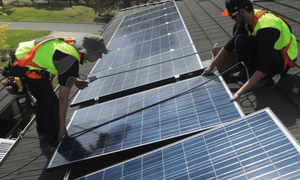Despite plummeting costs of renewables the government and the BCA insist that emissions reduction would be ‘economy wrecking’
Fresh from losing the economic fight about company tax cuts, the Coalition
government is doubling down on an economic fight about renewable
energy. And yet again, as they march into battle they have the Business
Council of Australia as their key source of economic and political
advice. What could go wrong?
The cost of renewable energy has fallen dramatically in the past 10 years and will continue to fall for years to come. By some accounts, new renewables with storage are already cheaper than coal fired power stations. Some argue that they aren’t quite there yet. But no one argues that in 30 years’ time a new coal-fired power station that has to buy coal will be able to compete with a solar farm that gets its sunshine for free.
Betting on the future cost of renewables is like catching a falling
knife, but if there is one thing that unites the Coalition and the BCA
it’s that they aren’t averse to self-inflicted wounds. At precisely the
time when the costs of renewables and storage are plummeting and the
world is meeting in Poland to discuss reductions in fossil fuel use, the
Liberal government and the peak body for the biggest businesses in
Australia are united in arguing that a 45% emissions reduction target by
2030 would be – in the words of BCA chief executive Jennifer Westacott – “economy wrecking”.The cost of renewable energy has fallen dramatically in the past 10 years and will continue to fall for years to come. By some accounts, new renewables with storage are already cheaper than coal fired power stations. Some argue that they aren’t quite there yet. But no one argues that in 30 years’ time a new coal-fired power station that has to buy coal will be able to compete with a solar farm that gets its sunshine for free.
As with the failed campaign for company tax cuts, the nation’s prime minister is getting his talking points from the nation’s biggest lobbyists. In parliament last week Scott Morrison declared “a 45% target is economy wrecking”, adding to a scare-campaign designed to convince the Australian public that they have to choose between the environment they want for their kids and the jobs they want for them. It is sickening.
Not even the BCA’s own members believe the rhetoric of their peak body. Both Commonwealth Bank and Citi have renewable energy targets of 100% – Citi by 2020. Other BCA members like the CSIRO have put out a transition road map which includes 90% electricity generation from solar PV and wind by 2050 while maintaining reliability in the grid.
Even big polluters like Rio Tinto boast that 75% of their electricity is carbon-free, while Origin has a 50% emissions reduction target.
Indeed, it wasn’t that long ago that Westacott herself was sceptical of the claim that action to decarbonise Australia’s energy system would “wreck the economy”. In fact, in 2009 when she was heading up KPMG’s Sustainability, Climate Change and Water practice she told the Senate that:
"The science of climate change indicates the economic risks posed to Australia are both materially significant and proportionally higher than for most other countries … global carbon pricing is inevitable … [and] given these economic risks, Australia needs to act to decouple energy and emissions growth from economic growth, or we will face steadily declining competitiveness as global carbon pricing and other controls increase.”
Of course, if the facts change it is good to change your mind. But it is hard to see what evidence Westacott and the BCA might be relying on. Not only have the costs of building large-scale wind, solar and battery projects collapsed since 2009, the retail costs of installing solar panels and batteries have declined similarly.
There are now more than two million Australian homes with solar panels on their roofs, and that means there are more than two million homes that know that renewables not only work to generate power, but they work to lower electricity bills as well. Opinion polls show that an overwhelming majority of Australians support rapid investment in renewable energy. The Australia Institute’s 2018 Climate of the Nation survey of Australian attitudes on climate change showed that 67% of Australians want to end coal-fired power within the next 20 years.
But it’s not just the economic and opinion polling evidence that suggests the BCA and Morrison government are pushing coal uphill. One of the key lessons from the recent company tax debate is that the Australian public no longer trust business leaders who claim that they are acting in the national interest rather than their self-interest. And when it comes to talking about electricity prices, the BCA’s biggest problem is that some of its biggest members are the biggest energy retailers who make some of the world’s biggest profits selling Australians some of the world’s dearest electricity.
What could go wrong indeed?
• Richard Denniss is chief economist for the Australia Institute

No comments:
Post a Comment